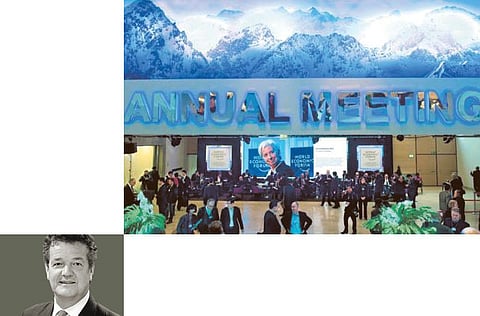Qandil woos Davos while riots rock Port Saeed
Egypt government has failed to develop inclusive governance

The new Islamist governments of the Arab world have a real challenge in formulating their economic policies. After almost a year in power, it is still hard to tell if the new leadership of Egypt wants to go the Turkish route and be economically liberal and global while at the same time socially conservative, or go a more narrow rejectionist route and try to build some kind of Islamist and protectionist economic bloc.
The people who have suddenly found themselves in power have very little experience in managing economies. Their whole political background has been defined by social and religious issues, and their political skills are in rousing people to oppose the previous dictatorships. So given this vacuum, any hints about their economic plans are very important.
Last week in Davos, the suave Egyptian Prime Minister Hesham Qandil was wooing the leaders of the international business world, while at the same time back home his police force was wading into the protesters in Port Saeed leaving tens of people dead. This sharp contrast between internationally amenable and ruthlessly authoritarian behaviour makes it hard to understand the new government’s position.
Qandil was not given a prime spot on the agenda at the World Economic Forum at Davos, but he was very active as he moved from meeting to meeting, smiling and speaking well and cogently in good English. Obviously, Qandil would only go to Davos to make a good impression on that audience of international businessman and politicians, and he is well placed to make a good impression as he called for foreign investment to come back to Egypt.
He has worked for years an international environment, both when he got his doctorate in biological and agricultural engineering from North Carolina State University, and later when he worked for six years as Chief of Water Resources in the African Development Bank, before he came back to help with the revolution in 2011.
Qandil was engagingly frank about the economic difficulties that his government faced. When grilled about the cost of subsidies, he was clear that they had to be cut, but added that to simply cut the lot across the board would cause huge social unrest. He plunged into a discussion on how to target subsidies on the poor who need them while taking them away from the rich who can do without them. He spoke of doing this through some kind of smart identity card for people use the cooperatives that would allow the government to target is aid to its population.
Oddly, just as Qandil was using Davos to make his pitch for more foreign investment to come back to Egypt, Dubai’s Majid Al Futtaim (MAF) announced that it wants to buy the supermarket arm of Egypt’s Mansour Group which includes the supermarket chain Metro and discount grocery store Kheir Zaman. MAF also announced that it would restart its long discussed project to build a huge mall in Cairo, the Mall of Egypt.
The MAF announcements are one case a growing appetite by Gulf groups to expand into the large markets of Egypt, in which they take advantage of the low valuations thanks to the political strife, but also take a stake in the likelihood that the Egyptian government will come up with the right mix of laws to attract long term foreign investment
Who is in charge?
But it is hard to tell if all the goodwill being put forward by Qandil is a genuine political initiative and part of a new and globally confident Islamist movement, or it he is simply window dressing for more repressive forces in the same government.
By an unhappy coincidence for the Egyptian prime minister, while he was in Davos the Egyptian courts issued out 21 death sentences to people convicted of causing the riots a year ago in which 74 people died in the Port Saeed stadium when fighting broke out between Port Saeed fans and supporters of visiting Al Ahly.
Political suspicion
Part of the political suspicion that dominates present day Egypt in the feeling the police encouraged the Port Saeed fans who are traditionally pro-Mubarak, to attack Al Ahly fans who were active in the Tahrir Square protests. If they did, then they would not have given any evidence, but now that death sentences are being handed down the families of the convicted will start to talk of police involvement so as to save their family members.
After riots, President Mohammad Mursi offered to meet the National Salvation Front and start a dialogue. But the opposition refused talks of any kind unless the president agrees to form a broad national unity government, calls fresh presidential elections and rewrites the country’s present constitution which was rammed through with no consultation last autumn.
The uncomfortable mix of liberal opposition parties which make up Egypt’s opposition National Salvation Front is very clear on this and has condemned the Mursi’s government from top to bottom, well aware that the Muslim Brotherhood president has formed a close alliance with the military, all of whom served under the Mubarak regime. This working alliance of former deadly foes has been to the great detriment of any liberal forces and any hopes of a more inclusive Egypt.
Sign up for the Daily Briefing
Get the latest news and updates straight to your inbox



